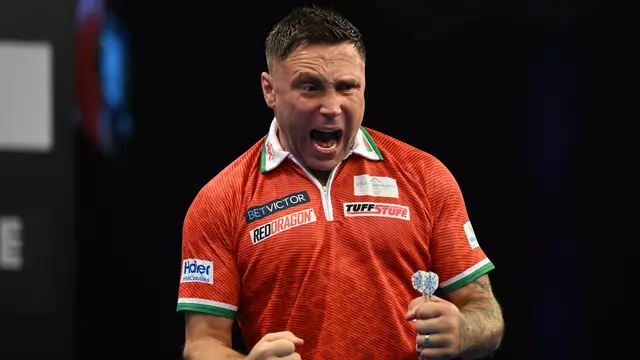
As the darts world gears up for another electrifying PDC World Darts Championship at the iconic Alexandra Palace, one of the sport’s most outspoken and talented figures has stepped forward with a passionate appeal for change. Gerwyn Price, the 2021 champion known as “The Iceman” for his cool demeanor under pressure (and occasional fiery outbursts), has publicly demanded a significant adjustment to how the tournament handles its famously raucous atmosphere. With the event just weeks away, Price’s plea has ignited debate among fans, players, and officials alike, highlighting the ongoing tension between the electric crowd energy that defines darts and the concentration required at the highest level.
Price, a former rugby professional turned darts superstar, has never shied away from controversy. His relationship with crowds has been complicated, to say the least. Beloved in his native Wales and often cheered in Ireland, he frequently becomes the pantomime villain elsewhere, drawing boos and jeers that can disrupt even the steadiest hand. This dynamic reached a boiling point in past championships, most notably when Price donned large ear defenders during a quarter-final match a few years back, attempting to block out the noise in a moment that stunned the sporting world. The stunt backfired spectacularly, leading to a heavy defeat, and prompted organizers to swiftly update rules prohibiting headphone-style ear defenders during play—though subtle in-ear plugs remain allowed for those who need them.
Reflecting on that infamous incident, Price has made it clear he has no intention of repeating it. “I wore the ear defenders once, and I won’t be wearing them again,” he stated firmly in recent comments. “It’s best left at that if I’m honest with you.” Instead, the Welshman is pushing for a broader, more systemic solution to protect players from excessive crowd interference while preserving the unique party-like vibe that makes Alexandra Palace the ultimate darts venue.
At the heart of Price’s demand is a call for stricter crowd control measures during matches, particularly when hostile chanting or booing crosses into territory that affects fair play. He argues that the current setup, while thrilling for spectators, can sometimes tip into unsportsmanlike behavior that disadvantages certain players. Price believes officials should implement clearer guidelines and quicker interventions—such as warnings, ejections for persistent offenders, or even temporary halts in play—to ensure the focus remains on the arrows rather than the antagonism. This isn’t about silencing the fans entirely, he emphasizes, but about creating a level playing field where skill triumphs over psychological warfare.
The timing of Price’s plea couldn’t be more poignant. Coming into this year’s championship, he finds himself in a strong position after a mixed but resilient season. Despite some frustrating results earlier in the year, Price has shown flashes of his world-beating form, reaching deep in several tournaments and reminding everyone why he once held the world number one ranking. As a seeded player, he enters Ally Pally with the experience of lifting the Sid Waddell Trophy and the hunger for a second title. Yet, the specter of crowd hostility looms large for him, as it does for other high-profile players who polarize opinions.
Price’s history with the World Championship adds weight to his words. His 2021 triumph was a masterpiece, overcoming top opponents in a pandemic-restricted environment with limited crowds—a factor some believe played to his strengths by reducing distractions. In subsequent years, with full houses returning, the atmosphere has intensified, turning the venue into a cauldron of noise, fancy dress, and relentless singing. For many, this is the magic of darts: an accessible, fun spectacle that blends elite sport with pub-like camaraderie. But for competitors like Price, who thrive on focus and rhythm, it can feel like throwing in a storm.
Expanding on his vision, Price suggests that minor tweaks could make a world of difference without diluting the event’s appeal. Ideas floating in discussions include designated “quiet zones” during critical legs, enhanced security presence around the stage, or even educational campaigns for fans on respectful cheering. “I’m not a fan of in-ear plugs that some players wear,” he added. “I’ve just got to grin and bear with whatever comes my way like I have the last couple of years, and just play darts.” Yet, his call for change underscores a desire for evolution in the sport, ensuring it grows sustainably as prize money soars and global attention explodes.
This isn’t the first time Price has voiced concerns about the PDC calendar or formats—he’s previously critiqued ranking systems and venue conditions in other events—but his focus on the World Championship strikes at the heart of darts’ identity. As the tournament approaches, with a stacked field including defending champions, teenage sensations, and veteran masters, all eyes will be on how organizers respond. Will they heed The Iceman’s warning and introduce measures to temper the crowd’s edge, or stand firm that the rowdy energy is non-negotiable?
One thing is certain: Gerwyn Price will step onto the oche ready to battle, arrows sharpened and mindset fortified. If his demand sparks real change, it could redefine the championship for years to come, balancing spectacle with sportsmanship in the quest for darts perfection. Fans packing Alexandra Palace this December will undoubtedly create memories, but Price hopes they’ll do so in a way that lets the best player win—fair and square.
Leave a Reply